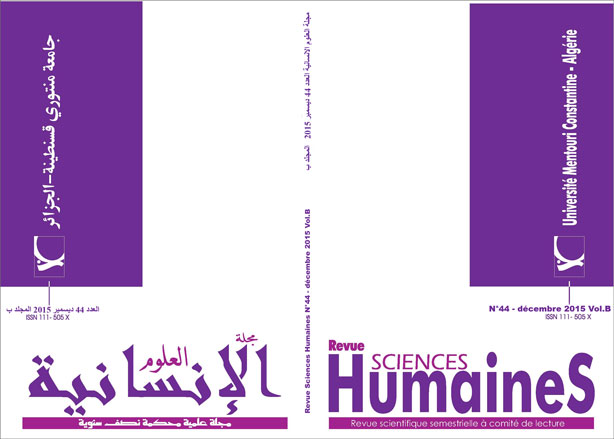The Impact of Extrinsic Reward on Learners’ Performance and Motivation in Reading
Keywords:
Tangible rewards, L2 reading motivation, Intensive reading activities, Reading comprehension performanceAbstract
This work examines the impact of extrinsic reward, as a motivation strategy, on students’ L2 reading motivation and performance. A total sample of 91 second year LMD students of English as a foreign language, at the Department of Arts and English Language University of Constantine 1, was involved in reading and performing intensive reading activities for a whole semester. Short stories, as a tangible reward, were offered at the end of each successful reading comprehension performance, to function as reinforcement for enhancing both reading performance and motivation. The results of students’ pre and post-reward reading comprehension performances show that students’ performance in reading was enhanced; whereas, those of the pre and post-reward reading motivation was not.
Downloads
References
Brophy, Jere. (2004). Motivating students to learn (2nd ed.). Mahwah, New Jersey: Lawrence Erlbaum Associates.
Brophy, Jere. (2010). Motivating students to learn (3rd ed.). New York: Routledge, Taylor & Francis.
Cameron, J., & Pierce, W.D. (1994).Reinforcement, reward, and intrinsic motivation. A meta analysis. Review of Educational Research, 64,363-423.
Cameron, Judy, & Pierce, David W. (2002). Rewards and intrinsic motivation: Resolving the controversy. Library of congress cataloging Westport, CT: Bergin & Garvey.
Deci, E.L.(1971). Effects of externally mediated rewards on intrinsic motivation. Journal of personality and social psychology,18,105-115.
Deci, Edward L., & Ryan, Richard M. (1985). Intrinsic motivation and self-
determination in human behavior. New York: Plenum.
Deci, Edward L., Koestner, R., & Ryan, R.(1999). A meta-analytic review of
experiments examining the effects of extrinsic rewards on intrinsic motivation. Psychological Bulletin, 125,627-668.
Deci, Edward L., Koestner, R., & Ryan, R.(2001). Extrinsic rewards and intrinsic motivation in education: reconsidered once again. Review of Educational Research, 71(1) pp1-27.
Deci, Edwared L., & Ryan, Richard M. (2008). Self-determination theory: A Macro-theory of human motivation, development, and health. Canadian Psychology,49, (3),182– 185.
Eccles, Jacquelynne S. (2005).Subjective task value and the Eccles et al. model of achievement-related choices. In Elliot, Andrew J.& Dweck, Carol S.(Eds), Handbook of competence and motivation (pp.105-121).The Guild Press: New York.
Flora Ray, Stephen. (2004). The power of reinforcement. State University of New York Press, Albany, State University of New York.
Gambrell, L., Palmer, B., Codling, R., & Mazzoni, S.(1996). Assessing motivation to read. The Reading Teacher, 49(7), 518-533.
Grabe, William.(2009).Reading in a second language: Moving from theory to practice. Cambridge: Cambridge University Press.
Kohn, Alfie. (1993). Punished by rewards: The trouble with gold stars, incentive plans, A’s, praise and other bribes. Boston: Houghton Mifflin.
Marink, Barbara A., & Gambrell, Linda A. (2008). Intrinsic motivation and rewards:
What sustains young children’s engagement with text? Literacy Research and
Instruction, 47; 9-26.
Mikulecky, Beatrice S., Jeffries, Linda. (2004). More reading power. New York:
Pearson Longman Education.
Pintrich, P. R., & Schunk, D. (2002). Motivation in education: Theory, research and applications. (2nd Ed). Upper Saddle River, NJ: Merrill Prentice Hall.
Ryan, R. M., & Deci, E. L. (2000). Self-determination theory and the facilitation of
intrinsic motivation, social development, and well-being. American Psychologist,
, 68-78.
Sansone, C. & Harackiewicz, J. M. (Eds.) (2000). Intrinsic and extrinsic motivation: The search for optimal motivation and performance. San Diego, CA: Academic Press.
Slavin, R. E. (2006). Educational psychology: theory and practice (8th ed.).Boston:
Pearson Education.
Wigfield, A., & Guthrie, J.T. (1997). Relations of children’s motivation for reading to the amount and breadth of their reading. Journal of Educational Psychology, 89,
-432.
















